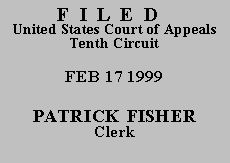

| UNITED STATES OF AMERICA,
Plaintiff-Appellee,
v.
RANDY LEE HURD,
aka Randy Hurd Defendant-Appellant. |
No. 98-7072
(D.C. No. 97-CR-9-S) |
Randy Lee Hurd was arrested after delivering approximately ten pounds of methamphetamine and was charged in an eight-count indictment with numerous federal drug violations. He entered into a plea bargain under which he pled guilty to one count of possession with intent to distribute methamphetamine and the government dismissed the remaining counts. Mr. Hurd was released on bond pending completion of the presentence report and he failed to appear for sentencing. He was apprehended and returned for sentencing several months later.
In sentencing Mr. Hurd, the district court awarded him a two-level reduction under U.S.S.G. § 5C1.2, and a three-level reduction for acceptance of responsibility. The court imposed a two-level enhancement for obstruction of justice based on Mr. Hurd's flight prior to sentencing, and denied his request for a downward departure. Mr. Hurd was sentenced to 168 months, the lowest possible sentence allowed by the applicable guideline range.
Mr. Hurd's attorney filed a notice of appeal(1) and subsequently filed a brief pursuant to Anders v. California, 386 U.S. 738 (1967). Anders holds that if after conscientious examination counsel finds a case to be wholly frivolous, he should so advise the court and request permission to withdraw. Counsel must in addition submit to both the court and his client a brief referring to anything in the record arguably supportive of the appeal. The client may then raise any points he chooses, and the appellate court thereafter undertakes a complete examination of all the proceedings and decides whether the appeal is wholly frivolous. If it so finds, it may grant counsel's request to withdraw. See id. at 744.
In his Anders brief, counsel presents two possible points: the district court's imposition of an upward adjustment for obstruction of justice and the court's denial of Mr. Hurd's motion for a downward departure. Counsel states his opinion that the appeal presents no non-frivolous issues and requests leave to withdraw as counsel. Mr. Hurd has not filed a pro se brief in response. Accordingly, we turn to an examination of the proceedings to determine if this appeal is wholly frivolous.
Under U.S.S.G. § 3C1.1, a defendant's offense level is increased two levels if he has obstructed justice. The commentary to that guideline includes as an example of obstructive conduct "willfully failing to appear, as ordered, for a judicial proceeding." Id. comment. (n.4(e)). See also United States v. St. Julian, 922 F.2d 563, 571 (10th Cir. 1990) (failure to appear for scheduled sentencing hearing justified imposition of enhancement for obstruction of justice). It is undisputed that Mr. Hurd willfully fled the jurisdiction after his release on bond and willfully failed to appear for his scheduled sentencing hearing. Accordingly, we see no error in the district court's imposition of an enhancement for obstruction of justice.
The district court refused to grant Mr. Hurd a downward departure. In so doing, the court clearly recognized that it had the discretion to depart downward but declined to do so. Because the court acknowledged its authority to grant such a departure, we have no jurisdiction to review its decision refusing to exercise that authority. See United States v. Rodriguez, 30 F.3d 1318, 1319 (10th Cir. 1994).
After review of the entire proceedings, we conclude that the record establishes no non-frivolous ground for appeal. The judgment is therefore AFFIRMED and counsel's motion to withdraw is GRANTED.
ENTERED FOR THE COURT
Stephanie K. Seymour
Chief Judge
*.This order and judgment is not binding precedent, except under the doctrines of law of the case, res judicata, or collateral estoppel. The court generally disfavors the citation of orders and judgments; nevertheless, an order and judgment may be cited under the terms and conditions of 10th Cir. R. 36.3.
1. Mr. Hurd's appeal was filed one day late. A defendant such as Mr. Hurd, "who filed his notice of appeal within the Rule 4(b) thirty-day extension period may obtain relief by showing excusable neglect notwithstanding his failure to file a motion seeking such relief within that same time frame." United States v. McMillan, 106 F.3d 322, 324 (10th Cir. 1997). Mr. Hurd filed his notice of appeal within the thirty-day extension period and the district court subsequently determined that excusable neglect was shown. Accordingly, we have jurisdiction over this appeal.